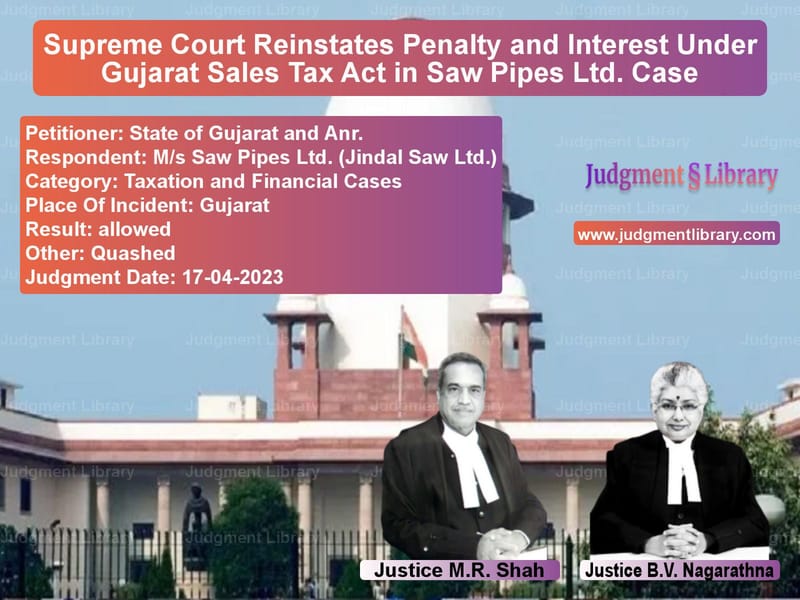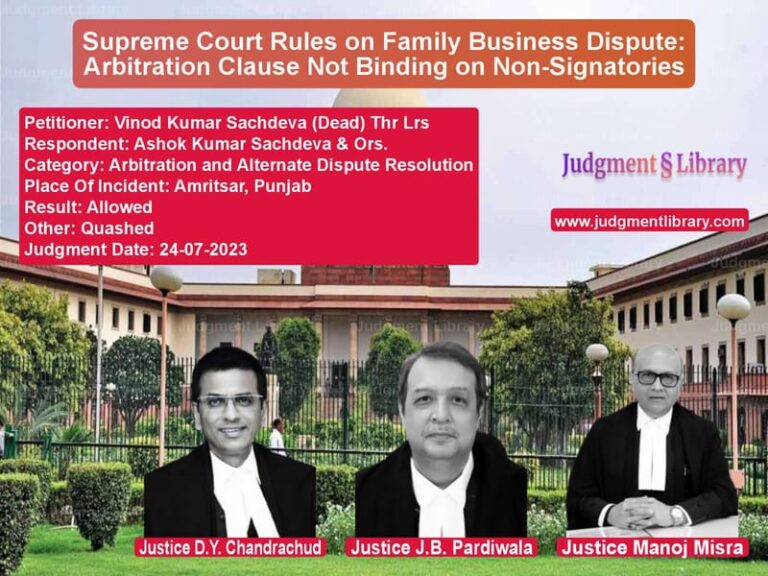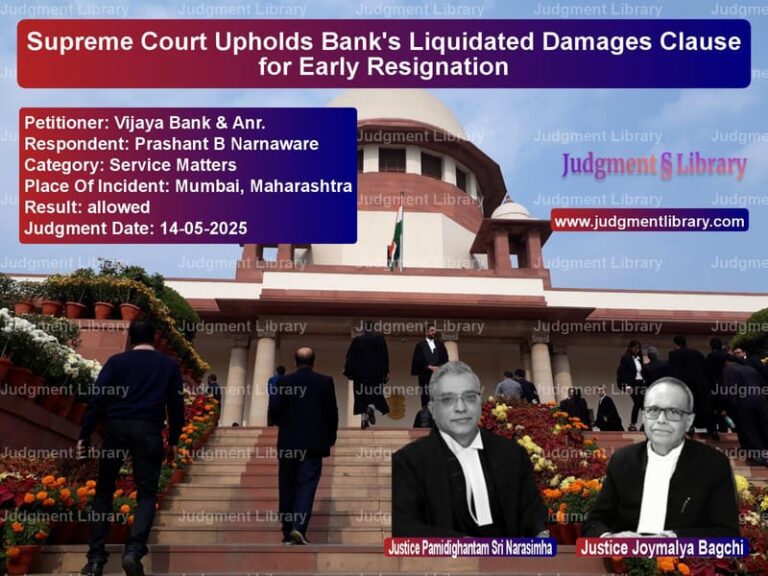Supreme Court Reinstates Penalty and Interest Under Gujarat Sales Tax Act in Saw Pipes Ltd. Case
The Supreme Court of India recently delivered a significant judgment in the case of State of Gujarat and Anr. v. M/s Saw Pipes Ltd. (Jindal Saw Ltd.), wherein it reinstated the penalty and interest imposed under the Gujarat Sales Tax Act, 1969. This case revolved around the tax liability of the respondent company, which had been engaging in the business of executing works contracts involving the coating of pipes.
The respondent had opted for a lump-sum tax payment at a concessional rate of 2%, believing that their contract fell under a civil works contract category. However, the tax authorities later determined that the contract should have been taxed at 12% under the residuary category. Consequently, the Assessing Officer (AO) imposed a penalty and interest under Sections 45(6) and 47(4A) of the Gujarat Sales Tax Act, 1969.
Case Background
The assessment order for the financial year 2002-03 held that the respondent company incorrectly paid tax at 2% instead of 12%, resulting in the following demand:
- Tax: ₹2,36,55,529
- Interest under Section 47(4A): ₹1,04,56,181
- Penalty under Section 45(6): ₹1,41,93,312
- Total Demand: ₹4,83,05,013
The company challenged the assessment before the appellate authorities and eventually before the Gujarat High Court, which set aside the penalty and interest, reasoning that the company had acted under a bona fide belief and had paid the tax once the higher rate was determined.
Arguments Before the Supreme Court
State of Gujarat’s Arguments
The State, represented by Ms. Aastha Mehta, contended that:
- The High Court erred in deleting the penalty and interest despite clear statutory provisions under Sections 45(6) and 47(4A).
- Section 45(6) mandates a penalty when there is a tax shortfall exceeding 25%, leaving no room for discretion.
- The company failed to correctly assess its tax liability, leading to substantial underpayment.
- Reliance was placed on the precedent of Union of India v. Dharamendra Textile Processors (2008), which held that statutory penalties are mandatory.
Respondent’s Arguments
The company, represented by Shri V. Lakshmikumaran, argued that:
- The differential tax payment was made in good faith based on expert advice.
- The company had no intent to evade taxes, and penalty provisions should require mens rea (guilty intent).
- Past High Court decisions in Brooke Bond India Ltd. v. State of Gujarat supported a lenient interpretation of penalty provisions.
- Section 45(6) allows for discretion, and the absence of deliberate evasion should warrant relief.
Supreme Court’s Judgment
The Supreme Court, in its judgment delivered by Justices M.R. Shah and B.V. Nagarathna, ruled that the High Court erred in setting aside the penalty and interest. The Court emphasized:
Interpretation of Section 45(6)
The Court reaffirmed that the penalty under Section 45(6) is statutory and mandatory, stating:
“The moment it is found that a dealer has failed to pay the tax to the extent mentioned in sub-section (5), the penalty is automatic.”
It further held that the use of the phrase “shall be levied” in the provision removes any discretion in imposing the penalty.
Rejection of Bona Fide Claim
The Court rejected the argument that the respondent acted under a bona fide belief, stating:
“Once the contravention is established, the penalty must follow irrespective of the presence of mens rea.”
Reliance on Precedents
The judgment cited several important precedents:
- Union of India v. Dharamendra Textile Processors (2008) – Holding that statutory penalties are mandatory once a breach is established.
- Shriram Mutual Fund v. SEBI (2006) – Establishing that the absence of intent is immaterial in civil penalties.
- Arcelor Mittal Nippon Steel India Ltd. v. State of Gujarat (2022) – Affirming the automatic nature of penalties under tax statutes.
Reinstatement of Penalty and Interest
The Supreme Court reinstated the penalty and interest, restoring the Assessing Officer’s order and allowing the appeal by the State of Gujarat.
Significance of the Judgment
This ruling clarifies that statutory penalties under tax laws must be imposed whenever a tax shortfall exceeds the prescribed limit, regardless of intent. It also reinforces the principle that courts cannot grant relief in mandatory penalty provisions unless explicitly provided by the legislature.
Petitioner Name: State of Gujarat and Anr..Respondent Name: M/s Saw Pipes Ltd. (Jindal Saw Ltd.).Judgment By: Justice M.R. Shah, Justice B.V. Nagarathna.Place Of Incident: Gujarat.Judgment Date: 17-04-2023.
Don’t miss out on the full details! Download the complete judgment in PDF format below and gain valuable insights instantly!
Download Judgment: state-of-gujarat-and-vs-ms-saw-pipes-ltd.-(-supreme-court-of-india-judgment-dated-17-04-2023.pdf
Directly Download Judgment: Directly download this Judgment
See all petitions in Income Tax Disputes
See all petitions in Tax Refund Disputes
See all petitions in Judgment by Mukeshkumar Rasikbhai Shah
See all petitions in Judgment by B.V. Nagarathna
See all petitions in allowed
See all petitions in Quashed
See all petitions in supreme court of India judgments April 2023
See all petitions in 2023 judgments
See all posts in Taxation and Financial Cases Category
See all allowed petitions in Taxation and Financial Cases Category
See all Dismissed petitions in Taxation and Financial Cases Category
See all partially allowed petitions in Taxation and Financial Cases Category







